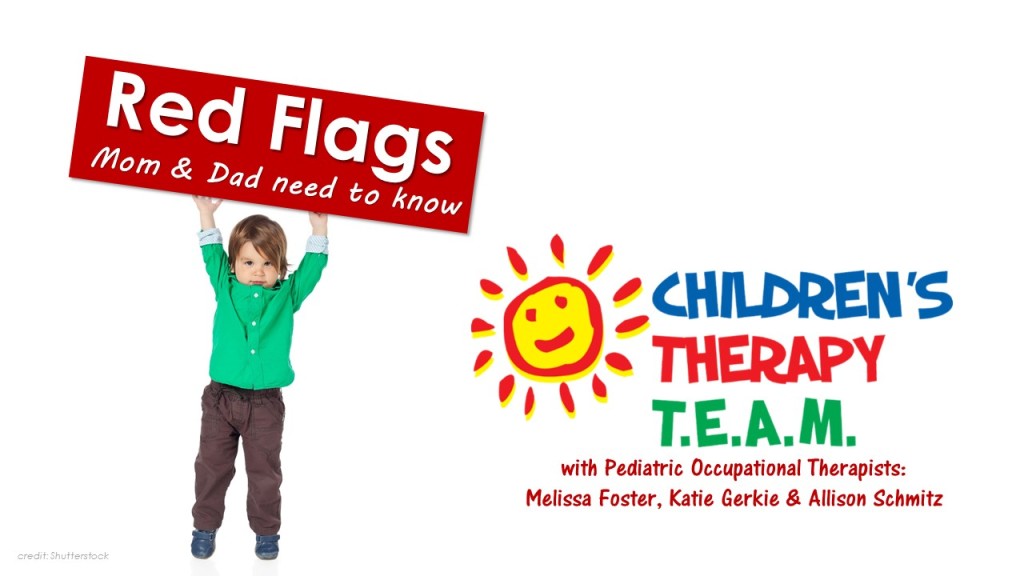Dear Melissa,
I have a 4 year old “typical” grandson who seems a bit behind in several areas. I am worried that he won’t be ready for kindergarten next year. How do I know if he would benefit from some type of therapy to help him be better prepared?
I have a 4 year old “typical” grandson who seems a bit behind in several areas. I am worried that he won’t be ready for kindergarten next year. How do I know if he would benefit from some type of therapy to help him be better prepared?
I, too, have a daughter in preschool. It seems as if any time I go to a birthday party or am talking to other parents/grandparents/teachers, I always get asked the question, “Is this normal?” or “How do I know if my child would benefit from therapy?” Yes, I can refer concerned caregivers to various developmental milestone lists, and I have included some of these developmental lists in the Resources section of this blog. However, through years of experience and observation with children we OT's, PT's and ST's just know in our gut that certain things are not quite right. Other times, there are certain things that may not be “typical” but are really just fine.
Over the next several weeks, I will be interviewing fellow occupational therapists, physical therapists, and speech therapists to determine what they feel are “red flags" for a child possibly needing therapeutic intervention. The focus of this series will not necessarily be children who have a specific diagnosis. Rather, it will focus on “typically-developing children” (generally pre-school-aged) who are not identified as having any type of specific delay, and when these children might benefit from therapy intervention to help improve success.
First of all, some of the best resources if you have concerns about your child’s development, are his/her pediatrician and any teachers your child may have. Teachers tend to have a good handle on what they typically see in their classroom, as well as which behaviors fall well outside the norm. In addition, your child’s teacher has also had the opportunity to observe your child for many hours at a time over several weeks, months, or even years. This helps the teacher to have a good idea as to what is an isolated oddity, and what is a pattern of troubling behavior. Pediatricians have a very solid base in child development, and a pediatrician will ultimately need to write a prescription for evaluation for any type of therapy interventions.
For the purpose of early concerns in OT, I enlisted the assistance of two of our fabulous TEAM occupational therapists, Allison Schmitz and Katie Gehrki. The following is a list of red flags they look for in determining whether a child would benefit from occupational therapy services:
Birth to 2 years of age:
- Not looking at caregiver's face or making eye contact
- Not crawling and going directly from sitting to pulling up/walking
- Crawling in an abnormal pattern (deviating from traditional crawling or “army crawling” patterns)
- Strong hand preference with the exclusion of the other hand
- Not reaching across midline (not reaching across the center of the body)
- Not feeding self (either not finger feeding or not attempting to use spoon/fork)
- Not isolating index finger by 1 year (to either point or grab objects)
- Not displaying “showing/sharing” behaviors, which include the act of looking at a caregiver with an, “Isn’t that neat?” look on the child’s face, even if no words are used
- Poor self-soothing skills
3 to 5 years of age:
- Not engaging in pretend play
- Still using gross grasp (whole-hand grasp for crayon or pencil)
- Either always stationary or never stationary
- Consistently screaming rather than attempting to use words
- Not engaging in play with peers
- Consistently screaming with transitions
- Throwing tantrums significantly more often than peers
- Appearing overly sensitive to grooming tasks
6 to 8 years of age:
- Falling behind peers academically
- Difficulty following the teacher's directions
- Unable to tie shoes
- Unable to cut food with a knife/fork
- Hyperactivity
- Being labeled a “bad kid” (There are NO BAD KIDS, OT can help determine why the child may be displaying bad behaviors)
- Having difficulty engaging with peers on the playground and/or in extracurricular activities.
- Not having friends
- Immature handwriting skills
- Poor organizational skills – forgets to turn in homework assignments, desk is messy, papers are messy, etc.
Please keep in mind that these are not lists of developmental milestones. You can follow the links below to find complete lists of OT milestones. However, the items above are simply items that cause concern for an OT. Again, if you have questions or concerns, please discuss them with your child’s pediatrician and teacher, or you can call our Family Support Referral Coordinator, Ashley Stewart, 479-521-8326.
Resources:
Developmental Milestones, CDC (accessed March 2016)
Ages & Stages, American Academy of Pediatrics (accessed March 2016)
Fine Motor and Visual Perceptual Checklist, Children’s Hospital of Orange County, (accessed March 2016)
Developmental Milestones, CDC (accessed March 2016)
Ages & Stages, American Academy of Pediatrics (accessed March 2016)
Fine Motor and Visual Perceptual Checklist, Children’s Hospital of Orange County, (accessed March 2016)

